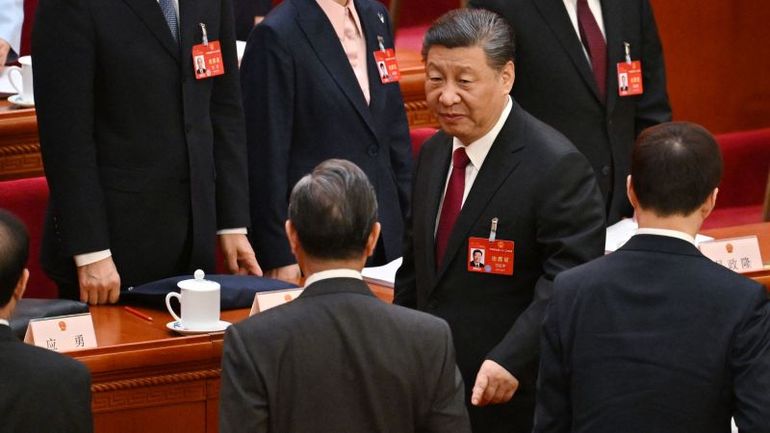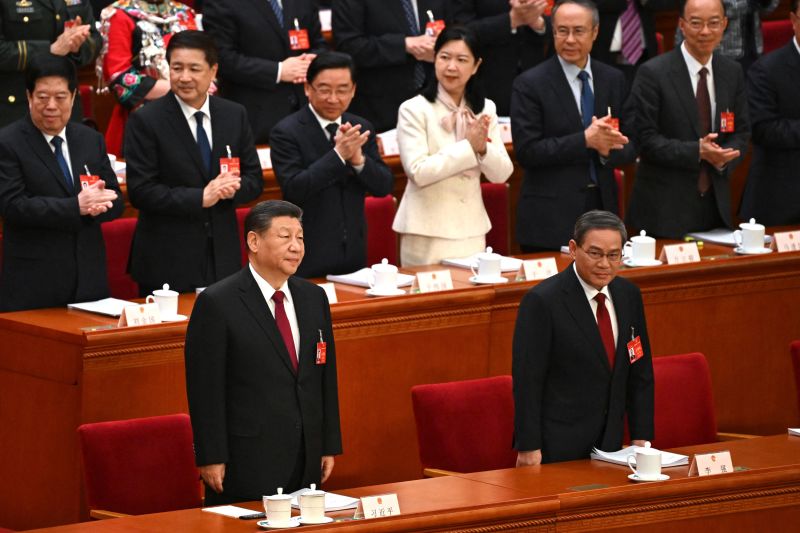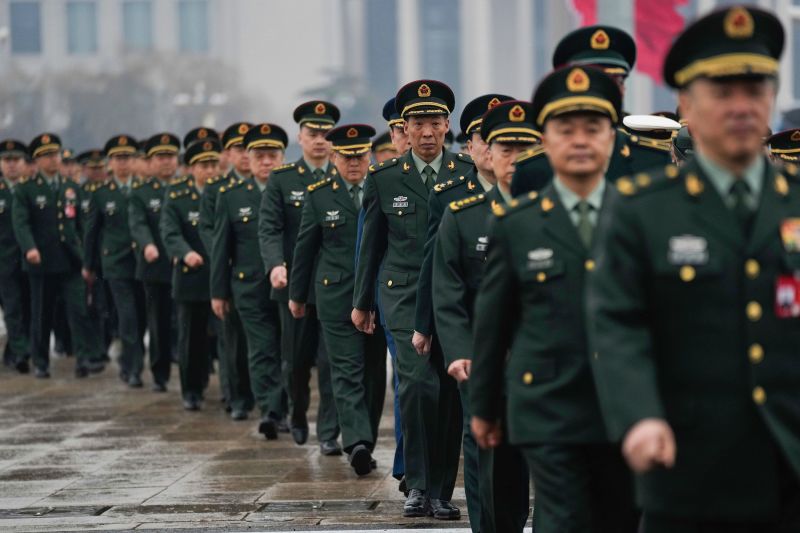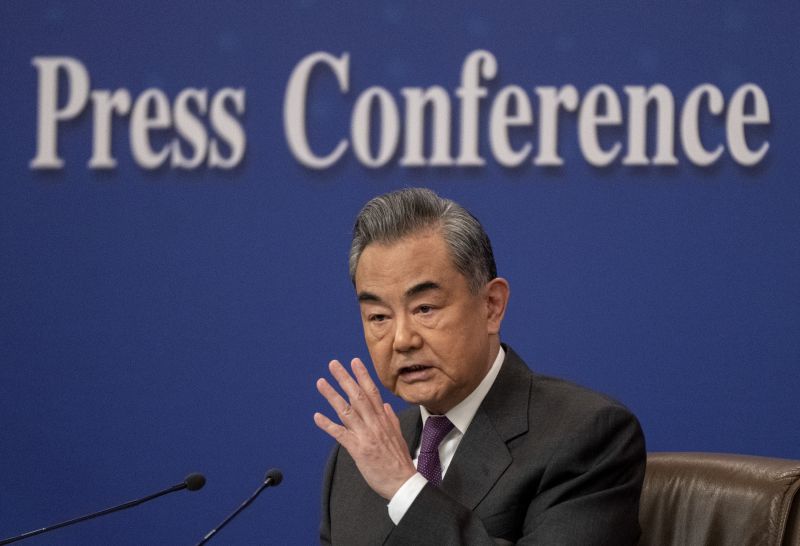
China's Post-Pandemic Era: Unmasked Faces, Unchanging Control

Gone are the days of face masks and distancing measures in post-pandemic China. Attendees at China's major political gathering relish in the freedom to socialize and enjoy traditional tea ceremonies without restrictions, signaling a return to pre-pandemic norms amid continued authoritative leadership under Xi Jinping.
At China's biggest political event of the year, thousands of delegates were finally able to mingle and sip tea without face masks or social distancing. For the first time in four years, the atmosphere at the Great Hall of the People in Beijing felt like the old days.
Although some Covid testing requirements are still in effect, the annual meetings of the national legislature and China's top political advisory body appear to have returned to a pre-pandemic state on the surface.
This year's event sheds light on the continued control and growing lack of transparency in the political system under leader Xi Jinping. He has emphasized security and tightened the Communist Party's control over all aspects, including the "two sessions."
Xi's influence is more prominent than ever at the gathering, which has typically been a platform for the Chinese premier and central government to showcase their achievements.
Beijing sent a strong signal ahead of the National People's Congress by announcing the cancellation of the premier's annual press conference, a tradition dating back three decades. This event, usually televised and highly anticipated, has been a key part of the meeting.
A government representative stated that the decision to cancel the press conference was made due to other interview opportunities available.
Observers noticed a missed opportunity for the global media, international observers, and Chinese citizens to gain valuable insight into the views of the country's second-in-command, responsible for overseeing the economy. This also allowed Xi to further solidify his control over the official narrative.
According to Liu Dongshu, an assistant professor specializing in Chinese politics at City University of Hong Kong, the press conference is typically the primary avenue for any senior official in China to directly communicate with the outside world, particularly with foreign media.
"If you consider how we view previous premiers, much of what we know about their character, reputation, and power comes from what they communicated in press conferences. By limiting this communication channel for the premier, it aligns with the message that Xi Jinping is the primary figure they want to highlight to the public, while others are seen as followers," he explained.
China's Premier Li Qiang speaks during a press conference after the closing session of the National People's Congress in Beijing on March 13, 2023.
China's Premier Li Qiang speaks during a press conference after the closing session of the National People's Congress in Beijing on March 13, 2023.
Greg Baker/AFP/Getty Images
Press conferences are usually tightly controlled events, but they can sometimes offer a glimpse into the personal views and opinions of China's top leaders. During these conferences, premiers have the opportunity to share their own perspectives and sometimes deviate from official statements, giving us a rare peek into the thoughts and discussions happening among China's elite.
In a memorable moment from the 2020 conference, former Premier Li Keqiang pointed out a stark reality. While President Xi Jinping praised China's progress in lifting people out of poverty, Li highlighted that 600 million individuals in the country were still living on a monthly income of just 1,000 yuan ($137).
Current premier Li Qiang, a close ally of Xi Jinping, was expected to lead the closing event. However, he did not show interest in doing so. During his first and possibly last press conference last year, Li emphasized the importance of the Communist Party over the state government.
During the government's work report delivery to delegates on Tuesday, Li mentioned Xi's name 16 times. He attributed the achievements of 2023 to General Secretary Xi Jinping, acknowledging his leadership and the guidance of Xi Jinping Thought.
Observers say that the cancellation of the conference is particularly significant, especially at a time when Beijing is working to boost business confidence.
Chinese leader Xi Jinping (left) and Premier Li Qiang (right) at the opening session of the National People's Congress in Beijing on March 5.
Chinese leader Xi Jinping (left) and Premier Li Qiang (right) at the opening session of the National People's Congress in Beijing on March 5.
Greg Baker/AFP/Getty Images
Related article
China sets ambitious economic growth target of ‘around 5%’ for 2024, vows to ‘transform’ economy
Liu in Hong Kong stated that holding press conferences is a way for the government to demonstrate that they care about how they are perceived by the public. This helps in creating an image of transparency and openness. He emphasized that while the press conference may not always provide new information, eliminating it sends a negative message regarding China's commitment to transparency and maintaining trust from outsiders.
Changhao Wei, a fellow at the Paul Tsai China Center of Yale Law School, pointed out that a spokesperson for the National People's Congress had suggested that the premier's press conference was unnecessary. This was because other government officials attending news conferences could serve as suitable replacements.
He mentioned that he doesn't find this reason very convincing. This year, the NPC only had 3 themed press conferences, whereas in 2019 there were 13 themed press conferences attended not only by administrative officials, but also by those from the courts and the legislature.
The premier's press conference was canceled at the same time as the overall shortening of the "two sessions," which was initially implemented during the pandemic to avoid the spread of Covid.
The move to restrict access for journalists also limits their chances to ask questions to delegates or government officials, whether in scheduled briefings or catching them as they come and go from the building.
Moreover, the dynamics of these interactions have shifted over time. In the past, reporters could easily get insightful comments from officials. However, nowadays, delegates are perceived as being more cautious in sharing information due to the current political atmosphere.
Delegates arrive at Beijing's Great Hall of the People on March 5 to attend the opening session of the National People's Congress annual meeting.
Delegates arrive at Beijing's Great Hall of the People on March 5 to attend the opening session of the National People's Congress annual meeting.
Tatan Syuflana/AP
Heavy security
Even as Covid-19 restrictions relaxed, the political heart of the city still showed heavy security measures, a common sight during the “two sessions” period.
Event attendees experienced additional security measures at certain entry points, including facial recognition scanners to verify entry clearance.
In Tiananmen Square's subway stations and nearby streets, security was tight as police were heavily present. Security vans were parked roadside and officers with muzzled police dogs monitored the crowds of people on their daily commutes.
Traffic was slowed by checkpoints on surrounding streets, with security officials even stopping and checking the IDs of cyclists on a major road near the square. In the surrounding neighborhoods, community "volunteers" in red outfits were also visible, keeping watch for any suspicious activity.
Even regular mail was becoming more closely monitored, as China's postal authority announced a new policy last month. This policy required double inspections for packages arriving during the two sessions period. Some residents expressed frustration on social media about the resulting delays.
Chinese Foreign Minister Wang Yi speaks during a news conference on the sidelines of the National People's Congress on March 7, 2024 in Beijing.
Chinese Foreign Minister Wang Yi speaks during a news conference on the sidelines of the National People's Congress on March 7, 2024 in Beijing.
Kevin Frayer/Getty Images
Related article
China slams ‘unfathomable absurdities’ of US trade controls as it hails Russia ties
Security is usually very strict at political events worldwide. In China, in addition to safety concerns, authorities are especially watchful for any signs of protest or criticism during important gatherings. They often increase measures to suppress any dissent or protest to keep dissidents and government critics quiet.
As the economy continues to struggle and people face financial difficulties, public frustration is growing. The government, led by the Communist Party, is trying to prevent negative stories and show a strong image. This year, officials may be especially cautious about any signs of unhappiness from the public.
Xi's government faced widespread demonstrations in late 2022 due to growing frustration with Covid-19 restrictions. The protests began after a lone protester in Beijing hung a banner criticizing Xi and his pandemic policies before a key Communist Party gathering. This incident led to increased security measures on bridges in the city.
This week, there were several temporary measures put in place around Tiananmen Square for the gathering.
When inquired about the possibility of reopening access to an area near the square after the event, a security guard simply replied, "you'll have to wait and see."
Editor's P/S:
The article highlights the significant changes and implications of the recently concluded National People's Congress and China's top political advisory body meetings. Despite the easing of COVID-19 restrictions, the event was characterized by heightened security measures, reflecting concerns about public dissent and a desire to maintain control. The cancellation of the premier's press conference is a particularly notable development, signaling Xi Jinping's growing dominance and the suppression of alternative voices within the government. This move limits media access and transparency, further consolidating the Communist Party's control over the official narrative.
Moreover, the article underscores the growing influence of Xi Jinping within the political system. The frequent mentions of his name in official statements and the emphasis on his leadership suggest his consolidation of power and his desire to shape China's future according to his vision. This shift is concerning for those who advocate for greater pluralism and accountability within the Chinese government. It remains to be seen how the increased concentration of power will impact China's domestic and foreign policies, as well as its relationship with the international community.

















